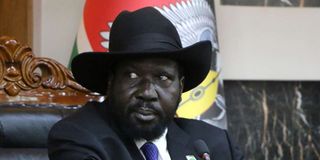All eyes on Kiir after S.Sudan completes reform meetings

South Sudan President Salva Kiir attends a press conference on February 15, 2020 in Juba.
What you need to know:
- The conferences were originally mooted in 2017 to help unite and reconcile the country after years of violence.
- The discourse, which was divided into two phases, began with grassroots regional meetings.
South Sudan’s President Salva Kiir may be the next entity to decide the country’s ultimate direction after the National Dialogue conferences proposed several legal changes to stabilise the country.
The conferences, originally mooted in 2017 to help unite and reconcile the country after years of violence, did not happen proper until the last two weeks.
And the discourse, which was divided into two phases, began with grassroots regional meetings and was concluded with the national conference.
The participants have presented solutions to local issues such as cattle rustling and land tenure, to more critical issues like whether the country should adopt a federal system.
Other critical issues include a suggestion for two presidential terms per holder, appointing South Sudanese with dual citizenship to senior government offices, and the return of the country to 32 states, among others.
The programme, led by a steering committee with funding from the Japanese embassy through UNDP, held Upper Nile, Bhar-el-Ghazel, and Equatoria regional conferences which all featured representatives at the grassroots levels.
In the recent final national event which ended on Wednesday, more than 500 representatives from various communities and political parties participated in the event.
Speaking at the closing event on Wednesday in Juba, President Salva Kiir revealed that the resolutions will be incorporated in the constitution.
“The National Dialogue has been broad-based bottom-up consultation. The revitalised agreement, on the other hand, came as a result of talks between political elites, which makes it narrow in scope,” Kiir said, referring to a 2018 peace agreement between him and various rebel movements which led to the formation of the government of national unity in February this year.
“However, the agreement has a constitutional sanctity that the National Dialogue lacks, despite its popular legitimacy. Therefore, we should not attempt to replace the agreement with the consensus reached through the National Dialogue,” Kiir said.
Kiir said the National Dialogue should be used as a guide to enrich the forthcoming permanent constitution-making process which the 2018 peace deal mandates.
Some in the conference, however, feared the country may just sweep the suggestions under the carpet, now that there is some sort of stability.
Jame Kolong, who heads Foundation for Democracy and Accountable Governance -- a civil and human rights advocacy organisation -- recommends the formation of a select committee to follow up on the resolutions' implementation processes.
Recommendations
“South Sudanese have reasons to doubt the commitment of the government towards implementing matters. The criticisms coming from citizens is, if the government isn’t able to implement a broader peace agreement that looks at the National Dialogue as a sub-component of the peace process, then how can it implement the dialogue resolutions?
“What is important now is translating the recommendations that have been made into tangible outcomes that must come in terms of improving the situation of this country. This can be done when a committee is constituted to monitor the resolutions implementation,” said Kolong.
Kuol Nyuon, an assistant professor of political science at the Department of Political Science in the University of Juba, argues that the resolutions can be best implemented if channelled through the clusters headed by Vice-Presidents as per the 2018 peace agreement.
“For those resolutions to be implemented, the vice-presidents need to be engaged and assigned accordingly, then forming committees to do follow up on the implementation processes, something which cannot be easily achieved.
“We all know that National Dialogue has been what the government has been singing all these years and thus my appeal to the president is, before the end of this year, the president should have implemented at least some resolutions,” said Kuol.
During the opening on the 3rd of November, Sudan People's Liberation Movement-In Opposition led by Dr Riek Machar and the National Democratic Movement led by Dr Lam Akol declined invitations to participate in the National Dialogue Conference.
It’s not clear why they rejected the invitation this time, given their parties are in the unity government formed in February. But Dr Lam Akol, in a tweet, claimed that the incumbent government is using the dialogue to avoid implementation of the 2018 Revitalised peace agreement.
However, the head of the United Nations Mission in South Sudan argued that the dialogue will strengthen the demands of ordinary South Sudanese who want a government that represents them more fully.
“The entire processes of National Dialogue happened during conflict times. As civil society, we believed the grassroots consultations at areas controlled by opposition groups by then were not reached and voices of those people were not gathered.
“And thus the parties that were not included should be given a chance because they constitute a very important spot that must also contribute towards the unique realisation of the dialogue,” said activist Jame Kolong.





